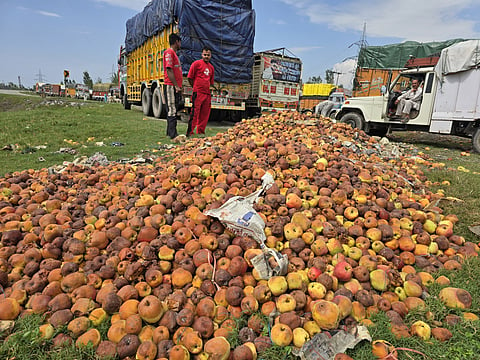Floods or Failure – What Truly Drowns Kashmir? Our Economic Chain Is Collapsing in Slow Motion Amidst Crises

The valley of Kashmir has always lived with the burden of geography. Its beauty, its orchards, its rivers, and its mountains are often invoked as symbols of abundance and resilience. But geography also imposes a cruel vulnerability. In recent weeks, torrential rains unleashed floods and landslides that did not simply wash away roads and submerge fields.
They laid bare the fragility of a society whose lifelines are hostage to weather, to a single road, and to the lethargy of the state. In the midst of these waters, the apple, that iconic fruit which sustains nearly four million people in the valley, has been stranded-harvested, boxed, loaded, and then left to rot on trucks marooned by the closure of the Srinagar-Jammu national highway.
Apple Crates That Should Have Reached Delhi Are Rotting In Kashmir
Walk through the orchards of Pulwama, Shopian or Kulgam these days and the paradox is unbearable. The branches are heavy with fruit, red and glistening, ready to fetch money that sustains households for an entire year. The air smells of ripening harvest, but also of damp earth, because the rains have not stopped. In one orchard I visited, a grower, Mohammad Ramzan, stood with his sons staring at crates stacked under a tarpaulin sheet. He had harvested nearly three hundred boxes, each box worth a small hope, each box linked to a debt that must be repaid.
The crates should have been on their way to Delhi or Azadpur mandi by now, where traders bid fiercely for Kashmiri apples in the early week of September. Instead, they sat in his yard, the wood of the boxes swelling from moisture. “We are watching money rot in front of our eyes,” he said quietly, What kind of life is this, where one road decides if we eat or starve?
Srinagar-Jammu Highway: Kashmir’s Fragile Artery
The Srinagar-Jammu highway has long been Kashmir’s fragile artery. Every year, rain or snow makes it impassable. Landslides at Banihal or Ramban cut the valley off from the plains. Everyone knows this. Everyone has suffered from it. Yet the state continues to treat it as the only dependable link. During this flood, convoys of stranded trucks stretched for kilometers. Drivers slept on the roadside, guarding perishable cargo.
One trader from Lassipora, Nazir Ahmad, had invested nearly ten lakh rupees this season, purchasing fruit from small growers on credit. His truck carrying nearly one thousand boxes was stopped near Ramban for five days. The apples began to spoil. By the time the road was cleared temporarily, he had lost nearly forty percent of his stock. “No insurance covers this. No relief comes for this. Tomorrow the bank will still ask for installments, and the growers will still wait for their payments. Who compensates us?” His words carried not anger but exhaustion, the weary knowledge that in this valley, vulnerability has been naturalized into destiny.
Floods Submerged Trust in an Already Fragile System
This crisis is not just about apples lying in villages or rotting in trucks. It is about an entire economic chain collapsing in slow motion. Growers invest all year in their orchards: pruning, spraying, fertilizing, and finally harvesting. Traders borrow money to buy in bulk, depending on timely sales to repay loans. Transporters live off margins of quick delivery. A single interruption throws everyone into debt.
When the floods came this September, they did not just submerge roads. They submerged trust in an already fragile system. The closure of the highway, once again, has exposed how Kashmir is at the mercy of one route, one chokepoint, one artery that the state has never seriously replaced with resilient alternatives.
Farmers Say The Special Train For Apples Cannot Lift A Valley’s Burden
The government has advertised its decision to run a special train for apples, a measure meant to offer some relief. Trains carrying fruit from Sopore to Jammu have been flagged off with ceremony. Officials present it as a breakthrough, a sign that the state cares. But on the ground, growers and traders dismiss it as tokenism. The capacity is limited, the logistics complicated, and the cost still high. In Pulwama, a group of growers told me that only a fraction of their produce would actually make it to the train. The rest would still have to wait for the road. One grower, Sameer Ahmad, said, “The train is for the cameras. It cannot lift a valley’s burden. We need reliable systems, not gestures.” His words capture the frustration of a people long used to being pacified with announcements rather than solutions.
As a researcher my fieldwork across south Kashmir these days reveals the raw edge of despair. In Shopian, I met a family whose orchard was partly submerged by flood waters. The apples had fallen into the mud, unsellable. They estimated their loss at nearly three lakh rupees. The father, Abdul Hamid, kept repeating, We work all year and watch nature and the state destroy us in one week. His son, a young man with a degree in commerce, added bitterly, “They ask us to stay with farming, but farming is staying with loss.”
In the fruit mandi at Pulwama, traders sat in groups, smoking and calculating losses. One said, In Delhi, the market waits. But what can we send? Here we are counting rot. The mandi, usually buzzing with bargaining and loading, felt like a funeral ground for commerce.
Officials Blame Natural Disaster, As If Nature Alone Is Responsible
These are not isolated voices. They are fragments of a pattern that repeats every few years. In 2014, floods devastated orchards and homes. In 2021, unseasonal snowfall destroyed half the crop. Every calamity exposes the absence of institutional buffers-no effective crop insurance, no robust cold storage network, no dependable alternative transport, no timely compensation. Growers and traders survive not because of the state but despite it, because they absorb losses personally, cut consumption, borrow more, and somehow start again the next season. This is resilience forced by neglect, not resilience nurtured by policy.
A deeper tragedy lies in how the state narrates these crises. Each time, officials emphasize natural disaster as if nature alone is responsible. But the floods are not only about heavy rains. They are about drainage systems clogged, rivers embanked without planning, deforestation in catchment areas, and infrastructure projects executed without ecological sense. Landslides on the highway are not acts of God. They are acts of negligence, where slopes are cut carelessly and stabilization ignored. What is presented as nature’s fury is often the state’s failure. By calling it natural, responsibility is deflected. Meanwhile, the grower and trader shoulder the costs.
Apple is Kashmir’s Cultural and Economic Backbone
The apple is not merely an agricultural product. It is Kashmir’s cultural and economic backbone. Nearly seventy percent of households depend on it directly or indirectly. It brings more than crores of rupees annually to the valley. When apples are stranded, it is not just fruit that is wasted. It is salaries that will not be paid, school fees that will be delayed, weddings that will be postponed, and medical bills that will remain unsettled. It is dignity that is eroded, one spoiled box at a time. A valley where men and women bend their backs all year in orchards finds itself humiliated because its produce cannot move forty kilometers past a landslide.
The trader’s predicament is particularly cruel. He stands between the grower, who expects payment, and the market, which demands timely delivery. When floods strike, he becomes the shock absorber of the system. He pays partial amounts to growers from borrowed money, takes the loss on spoiled stock, and loses reputation in outside markets. Thus, every flood leaves a long shadow. A trader in Awantipora told me, we are blamed by both sides. The grower thinks we are cheating him. The market thinks we are unreliable. In truth, it is the state that cheats us all.
The Floods Have Delivered A Harsh Truth
The question is not whether floods will come again. In a valley ringed by mountains, with rivers swollen by erratic rainfall linked to climate change, extreme weather is now certain. The question is whether the state has the imagination to build resilience.
Why does a region so dependent on one crop not have a comprehensive crop insurance scheme that actually delivers? Why does it not have decentralized cold storage where apples can wait for weeks without rotting? Why does it not diversify its transport corridors with air cargo subsidies or tunnel-based all-weather roads? Why are relief measures always reactive and symbolic, never structural?
Each unanswered question is a reminder that governance here is not about preventing suffering but about managing its optics.
In the end, the floods have delivered a harsh truth. Kashmir’s economy, like its politics, is trapped in a fragile architecture. It depends on one road, one gesture, one relief train, one announcement.
Every calamity exposes the absence of institutional buffers-no effective crop insurance, no robust cold storage network, no dependable alternative transport, no timely compensation
As I left an orchard in Pulwama, where crates lay waiting for a truck that could not come, an old grower said, “The apple is our blood. If the road is closed, our veins are cut.” His metaphor was exact. The highway is not merely asphalt. It is the artery of life. And each time it collapses, the valley bleeds.
This moment demands more than sympathy and token trains. It demands political reckoning. A society cannot be perpetually asked to endure loss as its natural condition. Relief must become resilience, policy must replace tokenism, and infrastructure must be planned for certainty rather than excuses.
Otherwise, every flood will be a repeat performance in which nature plays the villain, the state plays savior in the script of announcements, and the real victims-growers, traders, and ordinary families-play the expendable extras. People can live with floods. They cannot live forever with neglect disguised as destiny.
Dr. Irfan Ul Haq and Dr. Zahid Sultan hold PhDs in Political Science and are working as independent researchers
(Got a fresh perspective? C-KAR invites original articles and opinion pieces that haven’t been published elsewhere. Send your submissions to deputydirector@c-kar.com)







